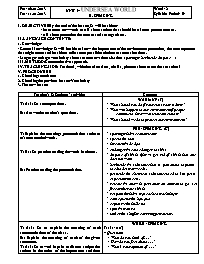Giáo án English 10 - Unit 9: Undersea world - B.Speaking - Năm học 2012-2013

I. OBJECTIVES: By the end of the lesson, Ss will be able to:
- learn more new words to talk about actions that should be taken to protect oceans.
- talk about protection the oceans and sea organisms.
II. LANGUAGE CONTENTS:
1. Knowledge:
- General knowledge: Ss will be able to know the importance of the environment protection, the consequences that might occur and be able to offer some possible solutions to some situations.
- Language: enlarge vocabulary about sea conservations (dustbin, sparingly, herbicide, dispose )
III. METHOD: Communicative approach.
IV. TEACHING AIDS: Textbook, whiteboard markers, chalks, pictures about name the sea animal
V. PROCEDURES
1. Checking attendance
2. Checking the previous lesson: Vocabulary
3. The new lesson
Pre : 06.01.2013 Tea: 11.01.2013 UNIT 9: UNDERSEA WORLD B. SPEAKING Week: 2 Syllable Period: 59 I. OBJECTIVES: By the end of the lesson, Ss will be able to: - learn more new words to talk about actions that should be taken to protect oceans. - talk about protection the oceans and sea organisms. II. LANGUAGE CONTENTS: 1. Knowledge: - General knowledge: Ss will be able to know the importance of the environment protection, the consequences that might occur and be able to offer some possible solutions to some situations. - Language: enlarge vocabulary about sea conservations (dustbin, sparingly, herbicide, dispose ) III. METHOD: Communicative approach. IV. TEACHING AIDS: Textbook, whiteboard markers, chalks, pictures about name the sea animal V. PROCEDURES 1. Checking attendance 2. Checking the previous lesson: Vocabulary 3. The new lesson Teacher’s & Students’ activities Contents T: Asks Sts some questions. Ss: Answer the teacher’s questions. WARM UP (5’) What should you do if your classroom is dirty? What will happen to our environment if people continue to throw waste unconsciously? What should we do to protect our environment? T: Explains the meanings, pronunciation and uses of some needed words. T: Has Sts practice reading the words in chorus. Ss: Practice reading the pronunciation. PRE - SPEAKING (8’) sparingly (adv) economically species (n) loài threaten (v) đe dọa endanger (v) cause danger to sb/st dispose of sb/sth (phr v) get rid of sb/sth that one does not want herbicide (v) substance that is poisonous to plants, used to destroy weeds. pesticide (n) chemical substance used to kill pests, especially insects. release (v) allow (a person or an animal) to go; set free or liberate sb/sth responsibly (adv) một cách có trách nhiệm consequence (n) hậu quả explosive (n) thuốc nổ spill (v) tràn ra tanker (n) ship for carrying petroleum. T: Asks Sts to explain the meaning of each sentence in front of the class. Ss: Explain the meaning of each of the given sentences. T: Asks Sts to work in pairs to discuss and put the actions in the order of the importance and then say what we should do or should not do. T: Goes round class to instructs Sts how to use Should and Shouldn’t. T: Gives some needed expressions for discussing: T: Asks some Sts to report what they have discussed. The answers may be various in different pairs. Asks Sts to explain the reason of their choice. T: Asks Sts to work in groups to discuss the consequences that might occur and offer some possible solutions. Asks Sts to take short notes of what they have discussed. Ss: Work in groups to discuss the consequences that might occur and offer some possible solutions. T: Goes round to offer any help if necessary. WHILE - SPEAKING Task1: (10’) * Questions: - What do you think of. . .? - How do you feel about . . .? - What’s your opinion of . . .? * Answers: - Well, I think we should/shouldn’t. . . - In my opinion, we should/shouldn’t. . . - As far as I’m concerned, we should/shouldn’t . . . Task 2: (10’) * Suggested Answers: Threats Consequences Solutions 1. Beaches filled with plastic bags. - polluted water - place plastic bags in proper dustbins. 2. Whales hunted for food - extinct / disappear - (Government) Don’t let people sell whale products. 3. Explosives used to catch fish. - a lot of fish died - be banned 4. Oil spilled from tankers - polluted water - punish captain 5. Pesticides blown off the fields into the sea - polluted water - Clean up the water before running into the sea. T: Asks some leaders from some groups to report to the class what their groups have discussed. Ss: Leaders from different groups to report to the class what they have discussed. T: Corrects mistakes and gives commendation. POST – SPEAKING Task 3: (10’) Report to the class what your groups have discussed. Ss: The first threats to the ocean is that(consequences) So, (solutions) T: Asks Sts to practice reporting what they discussed at home. Homework: (2’) - Learn by heart new words. - Practise talking about what we should or should not do. - Prepare for listening Comments & supplements:
Tài liệu đính kèm:
 B.speaking.doc
B.speaking.doc





